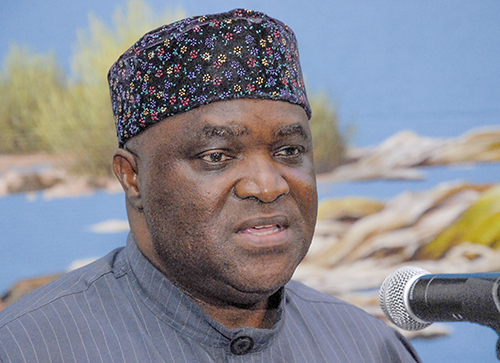Immigration minister Albert Kawana has proposed a visa exemption for Chinese nationals arriving in Namibia for a period of 30 days.
Officials at the home affairs ministry are reportedly unhappy with the relationship between senior ministry officials and the Chinese government. They are particularly concerned about conditions in the agreement which may disadvantage Namibia.
Kawana’s proposal is included in a letter dated 22 May which he wrote to the ministers of labour, titled ‘Proposed exemption of visa requirements between the government of the Republic of Namibia and the government of the People’s Republic of China for holders of diplomatic, official, service, public affairs and ordinary passports’.
“I would like to seek your opinion and support, before submitting the agreement to Cabinet. I should be grateful if the matter receives your attention at the earliest convenience, preferably by or before Monday, 29 May,” he wrote in the letter.
In the same letter, Kawana assured his colleagues that attorney general Feasts Mbandeka had scrutinised the agreement that would allow Chinese nationals to enter Namibia for one month without a visa being required.
The visa exemption deal is believed to have been conceived in March, when a three-person delegation from the Namibian government travelled to Beijing for an all-expenses-paid trip sponsored by the Chinese government.
The negotiations between the two countries were allegedly kept secret by top officials in the immigration ministry.
The speed at which the proposal was being pushed raised concern within the government about whether such a move was really in Namibia’s interest.
Official opposition leader McHenry Venaani said his party will vehemently reject the move.
He said the country’s visa regime should be governed by the benefits Namibia will accrue from China, such as tourists who will spend money in the country.
“It is just another hoodwinking process for Chinese prisoners to come here, as well as delinquents of Chinese society to come and settle in Namibia,” he said.
Aspiring president Job Amupanda also complained about the deal on his social media platforms over the weekend.
He posted that Namibian politicians and executive directors have been successfully bought by the Chinese.
He also said the agreement is a deal between the ruling party and China for support for next year’s presidential and National Assembly elections.
“It is planned for Chinese unemployed, criminals, [the] uneducated and rejects to come in our country to work on tenders the Chinese will get from the corrupt regime,” Amupanda wrote.
NOTHING WRONG
Kawana told The Namibian yesterday there is nothing wrong with the proposal, branding opposition to it as “Chinese phobia”.
He said the proposal’s main goal is to attract tourists and to be competitive after the effects of the Covid-19 pandemic.
“Before Covid-19, we used to receive 22 000 Chinese tourists per year. That number completely dried up after Covid-19,” Kawana said.
“Check what Zambia did. They have removed the visa restrictions to attract tourists.”
Kawana said he was surprised about the objections to the proposal, considering it could be a win-win arrangement with Beijing that would eventually benefit Namibians who want to buy goods in China.
“This will be an opportunity for them [business people] to go to China to buy products when that agreement comes into force,” he said.
He said the same courtesy is offered to various countries in Europe and the West, but there have been no objections.
“Recently, the Cabinet approved a number of countries whose nationals can obtain visas upon arrival,” he said.
He further said the government finds it annoying that citizens from Europe and North America come to Namibia without restrictions and Namibians don’t complain.
There is also a need for a reciprocal relationship when visa relaxation agreements are enforced, he said.
“Just before I came to lead home affairs, there was an immigration agreement with Russia to facilitate similar privileges,” he said.
However, those privileges are meaningless if Namibia does not benefit or is given the same courtesy by countries given special treatment, he said.
HISTORICAL
The number of Chinese nationals coming to Namibia has always attracted public debate, especially with the introduction of unskilled labour in state-backed contracts worth billions.
The government has increasingly handed key state systems contracts to Chinese backed companies, including Namibia’s immigration system.
Another system is a N$180 million tender to build an internet-based tax administration system for the finance ministry.
It all started in 2014 when the finance ministry awarded this contract to a joint venture between a company owned by businessman Vaino Nghipondoka, Profile Investments, and Beijing CSSCA Technologies, a company with direct ties to the Chinese government.
The tax platform contract was meant to build a system and online platform for more than 767 500 taxpayers across the country. But the new system largely failed to live up to expectations after concerns about technical capacity and user friendliness.
The Namibian government has over the years been accused of favouring Chinese companies, including a company that is constructing the Swapo’s headquarters in Windhoek for over N$730 million.
Five years ago, former immigration minister Pendukeni Iivula-Ithana had to provide a statement in parliament to clarify the total number of Chinese nationals in Namibia.
“Our most reliable figures are based on records drawn from the issuance of permanent residence permits since 1990 up to 21 February 2017, which currently stands at 1 358,” she said at the time.
She said employment permit holders account for 4 470, while temporary residence permit holders who accompany residents as dependants, usually spouses and children, number 1 124.
Iivula-Ithana said employment permits are granted for a minimum period of one year, or up to two years, and to a very lesser extent, for period not exceeding three years, thus the ministry’s response is based mainly on records for the last three years, given the expiry of previously issued permits.
Stay informed with The Namibian – your source for credible journalism. Get in-depth reporting and opinions for
only N$85 a month. Invest in journalism, invest in democracy –
Subscribe Now!






